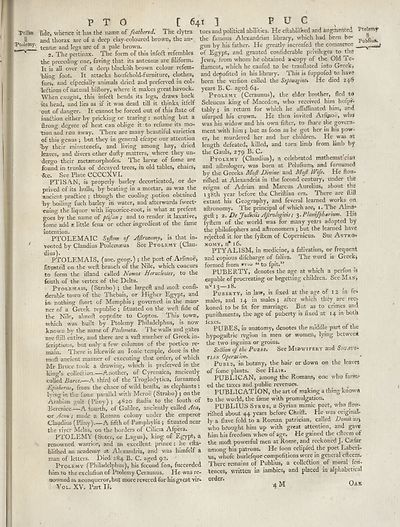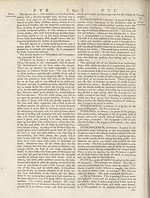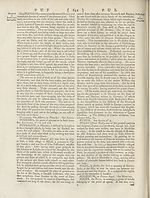Encyclopaedia Britannica > Volume 15, PLA-RAM
(709) Page 641
Download files
Complete book:
Individual page:
Thumbnail gallery: Grid view | List view

Ptifan
I!
Ptolemy.
PTO
Title, whence it has the name of feathered.
and thorax are of a deep clay-coloured brown, the an¬
tennae and legs are of a pale brown.
2. The pertinax. The foim of this infeft refembles
the preceding one, favitig that its antennae are filiform.
It is all over of a deep blackiih brown colour refem-
bling foot. It attacks houfehold-furniture, clothes,
furs, and efpccially animals dried and preferved in col-
lettions of natural hiftory, where it makes great havock.
When caught, this infetft bends its legs, draws back
its head, and lies as if it was dead till it thinks itlelf
out of danger. It cannot be forced out of this Hate ot
inaction either by pricking or tearing ; nothing but a
lirong degree of heat can oblige it to refume its mo¬
tion and run away. There are many beautiiul varieties
of this genus ; but they in general efcape our attention
"by their minutenefs, and living among hay, dried
leaves, and divers other dully matters, where they un¬
dergo their metamorphofes. The larvae of fome are
found in trunks of decayed trees, in old tables, chairs,
&c. See Plate CCCCXVI.
PTISAN, is properly barley decorticated, or de¬
prived of its hulls, by beating in a mortar, as was the
ancient pra&ice ; though the cooling potion obtained
by boiling fuch barley in water, and afterwards fweet-
euing the liquor with liquorice-root, is what at prefent
goes by the name of ptifan ; and to render it laxative,
fome add a little fena or other ingredient of the fame
intention.
PTOLEMAIC Syjlem of 4ftronomyy i9 t^at 'n_
vented by Claudius Ptolemaeus See Ptolemy (Clau-
dius).
PTOLEMAIS, (anc. geog.) ; the port of Arfinoe,
fituated on the well branch of the Nile, which concurs
to form the ifland called Nomos Heracleoles} to the
fouth of the vertex of the Delta.
Ptolemais, (Strabo) ; the largeft and moll confi-
derable town of the Thebais, or Higher Egypt, and
in nothing fhort of Memphis; governed in the man*
ner of a Greek republic ; fituated on the well fide of
the Nile, ahnoll oppofite to Coptos. This town,
which was built by Ptolemy Philadelphus, is now
known bv the name of Ptolometa. The walls and gates
are Hill entire, and there are a vail number of Greek in-
icriptions, but only a few columns of the portico re¬
main. There is likewife an Ionic temple, done in the
moll ancient manner of executing that order, of which
Mr Bruce took a drawing, which is preferved m the
king’s collection.—Another, of Cyrenaica, anciently
called Barce.—A third of the Troglodytica, furnamed
Epitheras, from the chace of wild bealls, as elephants i
lying in the fame parallel with Meroe (Strabo) ; on the
Arabian gull (Pliny) ; 4820 ftadia to the fouth of
Berenice.—A fourth, of Galilee, anciently called Aca>
•or Aeon ; made a Roman colony under the emperor
Claudius (Pliny).—A fifth of Pamphylia ; fituated near
the river Melas, on the borders of Cilicia Afpera.
PTOLEMY (Soter, or Lagus), king of Egypt* a
renowned warrior, and an excellent prince : he ella-
blilhed an academy at Alexandria, and was himfelf a
man of letters. Died 284 B. C. aged 92.
Ptolemy (Philadelphus), his fecond fon, fucceeded
him to the exclufion of Ptolemy Ceraunus. He was re¬
nowned as a conqueror, but more revered for his great vir-
Vcl. XV. Part II.
t 64i 1 ... P U C
The elytra tues and political abilities. He ellablifned and augthentea
the famous Alexandrian library, which had been be¬
gun by his father. He greatly increafed the commerce
of Egypt, and granted conliderable privileges to the
Jews, from whom he obtained a*copy of the Old Te-
ftament, which he caufed to be tranllated into Greek,
and depofited in his library. This is fuppofed to have
been the verfion called the SeptuaginU He died 246
years B. C. aged 64.
Ptolemy (Ceraunus), the elder brother, fled M
Seleucus king of Macedon, who received him hofpi1'-
tably ; in return for which he aflaflinated him, and
ufurped his crown. He then invited Arfijaoe, who
was his widow and his own filler, to lhare the govern¬
ment with him ; but as foOn as he got her in his pow¬
er, he murdered her and her children. He was at
length defeated, killed, and torn limb from limb by
the Gauls, 279 B. C.
Ptolemy (Claudius), a celebrated mathematcian
and allrologer, was born at Pelufium* and furnamed
by the Greeks Mo ft Divine and Mojl IVife. He flou-
rilhed at Alexandria in the fecond century, under the
reigns of Adrian and Marcus Aurelius, about the
138th year before the Chrillian era. There are Hill
extant his Geography, and feveral learned works on
allronomy. The principal of which are, 1. The Alma-
gell ; 2. De Judiciit AJlrologtcts; Planifpbtrium. His
fyftem of the world was for many years adopted by
the philofophers and aftronomers ; but the learned have
reje&ed it for the fyftem of Copernicus. Sec Astro*
nomy, n* 16.
PTYALISM, in medicine, a falivation, or frequent
and copious difeharge of faliva. The word is Greek*
formed from “ to fpit.”
PUBERTY, denotes the age at which a perfon is
capable of procreating or begetting children. See Man,
nai3—18.
Puberty, in law, is fixed at the age of 12 in fo
males, and 14 in males; after which they are rec¬
koned to be fit for marriage. But as to crimes and
punifhments, the age of puberty is fixed at 14 in both
iexes.
PUBES, in anatomy, denotes the middle part of the
hypogaftric region in men or women, lying betweeA
the two inguina or groins.
Seftion of the Pubes. See Midwifery and SiGAVt*
TIAN Operation* *
Pubes, in botany, the hair or down on the leaves
of fome plants. See Hair.
PUBLICAN, among the Romans, one who farm¬
ed the taxes and public revenues.
PUBLICATION, the art of making a thing known
to the world, the fame with promulgation.
PUBLIUS Syrus, a Syrian mimic poet, who flou-
riflied about 44 years before Chrift. He was original¬
ly a flave fold to a Roman patrician, called Domkhis)
who brought him up with great attention, and gave
him his freedom when of age. He gained the efleem of
the moil powerful men at Rome, and reckoned]. Ciefar
among his patrons. He loon eclipfed the poet Laberi-
us, whofe burlefque compofitions were in general elleem.
There remains of Publius, a colleftion of moral fett-
tences, written in iambics, and placed in alphabetical
order. ^
Oak
Ptolemy
Ns
Publius
I!
Ptolemy.
PTO
Title, whence it has the name of feathered.
and thorax are of a deep clay-coloured brown, the an¬
tennae and legs are of a pale brown.
2. The pertinax. The foim of this infeft refembles
the preceding one, favitig that its antennae are filiform.
It is all over of a deep blackiih brown colour refem-
bling foot. It attacks houfehold-furniture, clothes,
furs, and efpccially animals dried and preferved in col-
lettions of natural hiftory, where it makes great havock.
When caught, this infetft bends its legs, draws back
its head, and lies as if it was dead till it thinks itlelf
out of danger. It cannot be forced out of this Hate ot
inaction either by pricking or tearing ; nothing but a
lirong degree of heat can oblige it to refume its mo¬
tion and run away. There are many beautiiul varieties
of this genus ; but they in general efcape our attention
"by their minutenefs, and living among hay, dried
leaves, and divers other dully matters, where they un¬
dergo their metamorphofes. The larvae of fome are
found in trunks of decayed trees, in old tables, chairs,
&c. See Plate CCCCXVI.
PTISAN, is properly barley decorticated, or de¬
prived of its hulls, by beating in a mortar, as was the
ancient pra&ice ; though the cooling potion obtained
by boiling fuch barley in water, and afterwards fweet-
euing the liquor with liquorice-root, is what at prefent
goes by the name of ptifan ; and to render it laxative,
fome add a little fena or other ingredient of the fame
intention.
PTOLEMAIC Syjlem of 4ftronomyy i9 t^at 'n_
vented by Claudius Ptolemaeus See Ptolemy (Clau-
dius).
PTOLEMAIS, (anc. geog.) ; the port of Arfinoe,
fituated on the well branch of the Nile, which concurs
to form the ifland called Nomos Heracleoles} to the
fouth of the vertex of the Delta.
Ptolemais, (Strabo) ; the largeft and moll confi-
derable town of the Thebais, or Higher Egypt, and
in nothing fhort of Memphis; governed in the man*
ner of a Greek republic ; fituated on the well fide of
the Nile, ahnoll oppofite to Coptos. This town,
which was built by Ptolemy Philadelphus, is now
known bv the name of Ptolometa. The walls and gates
are Hill entire, and there are a vail number of Greek in-
icriptions, but only a few columns of the portico re¬
main. There is likewife an Ionic temple, done in the
moll ancient manner of executing that order, of which
Mr Bruce took a drawing, which is preferved m the
king’s collection.—Another, of Cyrenaica, anciently
called Barce.—A third of the Troglodytica, furnamed
Epitheras, from the chace of wild bealls, as elephants i
lying in the fame parallel with Meroe (Strabo) ; on the
Arabian gull (Pliny) ; 4820 ftadia to the fouth of
Berenice.—A fourth, of Galilee, anciently called Aca>
•or Aeon ; made a Roman colony under the emperor
Claudius (Pliny).—A fifth of Pamphylia ; fituated near
the river Melas, on the borders of Cilicia Afpera.
PTOLEMY (Soter, or Lagus), king of Egypt* a
renowned warrior, and an excellent prince : he ella-
blilhed an academy at Alexandria, and was himfelf a
man of letters. Died 284 B. C. aged 92.
Ptolemy (Philadelphus), his fecond fon, fucceeded
him to the exclufion of Ptolemy Ceraunus. He was re¬
nowned as a conqueror, but more revered for his great vir-
Vcl. XV. Part II.
t 64i 1 ... P U C
The elytra tues and political abilities. He ellablifned and augthentea
the famous Alexandrian library, which had been be¬
gun by his father. He greatly increafed the commerce
of Egypt, and granted conliderable privileges to the
Jews, from whom he obtained a*copy of the Old Te-
ftament, which he caufed to be tranllated into Greek,
and depofited in his library. This is fuppofed to have
been the verfion called the SeptuaginU He died 246
years B. C. aged 64.
Ptolemy (Ceraunus), the elder brother, fled M
Seleucus king of Macedon, who received him hofpi1'-
tably ; in return for which he aflaflinated him, and
ufurped his crown. He then invited Arfijaoe, who
was his widow and his own filler, to lhare the govern¬
ment with him ; but as foOn as he got her in his pow¬
er, he murdered her and her children. He was at
length defeated, killed, and torn limb from limb by
the Gauls, 279 B. C.
Ptolemy (Claudius), a celebrated mathematcian
and allrologer, was born at Pelufium* and furnamed
by the Greeks Mo ft Divine and Mojl IVife. He flou-
rilhed at Alexandria in the fecond century, under the
reigns of Adrian and Marcus Aurelius, about the
138th year before the Chrillian era. There are Hill
extant his Geography, and feveral learned works on
allronomy. The principal of which are, 1. The Alma-
gell ; 2. De Judiciit AJlrologtcts; Planifpbtrium. His
fyftem of the world was for many years adopted by
the philofophers and aftronomers ; but the learned have
reje&ed it for the fyftem of Copernicus. Sec Astro*
nomy, n* 16.
PTYALISM, in medicine, a falivation, or frequent
and copious difeharge of faliva. The word is Greek*
formed from “ to fpit.”
PUBERTY, denotes the age at which a perfon is
capable of procreating or begetting children. See Man,
nai3—18.
Puberty, in law, is fixed at the age of 12 in fo
males, and 14 in males; after which they are rec¬
koned to be fit for marriage. But as to crimes and
punifhments, the age of puberty is fixed at 14 in both
iexes.
PUBES, in anatomy, denotes the middle part of the
hypogaftric region in men or women, lying betweeA
the two inguina or groins.
Seftion of the Pubes. See Midwifery and SiGAVt*
TIAN Operation* *
Pubes, in botany, the hair or down on the leaves
of fome plants. See Hair.
PUBLICAN, among the Romans, one who farm¬
ed the taxes and public revenues.
PUBLICATION, the art of making a thing known
to the world, the fame with promulgation.
PUBLIUS Syrus, a Syrian mimic poet, who flou-
riflied about 44 years before Chrift. He was original¬
ly a flave fold to a Roman patrician, called Domkhis)
who brought him up with great attention, and gave
him his freedom when of age. He gained the efleem of
the moil powerful men at Rome, and reckoned]. Ciefar
among his patrons. He loon eclipfed the poet Laberi-
us, whofe burlefque compofitions were in general elleem.
There remains of Publius, a colleftion of moral fett-
tences, written in iambics, and placed in alphabetical
order. ^
Oak
Ptolemy
Ns
Publius
Set display mode to:
![]() Universal Viewer |
Universal Viewer | ![]() Mirador |
Large image | Transcription
Mirador |
Large image | Transcription
Images and transcriptions on this page, including medium image downloads, may be used under the Creative Commons Attribution 4.0 International Licence unless otherwise stated. ![]()
| Encyclopaedia Britannica > Encyclopaedia Britannica > Volume 15, PLA-RAM > (709) Page 641 |
|---|
| Permanent URL | https://digital.nls.uk/191909993 |
|---|
| Attribution and copyright: |
|
|---|
| Description | Ten editions of 'Encyclopaedia Britannica', issued from 1768-1903, in 231 volumes. Originally issued in 100 weekly parts (3 volumes) between 1768 and 1771 by publishers: Colin Macfarquhar and Andrew Bell (Edinburgh); editor: William Smellie: engraver: Andrew Bell. Expanded editions in the 19th century featured more volumes and contributions from leading experts in their fields. Managed and published in Edinburgh up to the 9th edition (25 volumes, from 1875-1889); the 10th edition (1902-1903) re-issued the 9th edition, with 11 supplementary volumes. |
|---|---|
| Additional NLS resources: |
|

